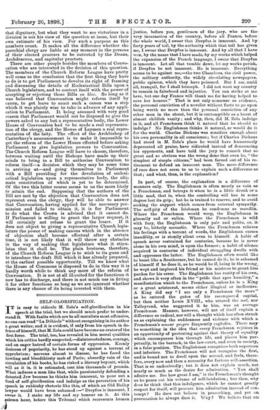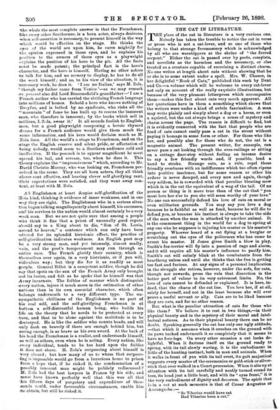SELF-GLORIFICATION.
IT is easy to ridicule M. Zola's self-glorification in his speech at the trial, but we should much prefer to under- stand it. With faults which are to all moralists most offensive, no one can read "La Debacle" without recognising in its author a great writer, and it is evident., if only from his speech in de- fence of himself, that M. Zola could have become an oratorof the first force. The trial, too, has revealed in him moral qualities which his critics hardly suspected,—disinterestedness, courage, and an eager hatred of certain forms of oppression. Keenly desirous of popularity, he has stood up against a torrent of opprobrium; nervous almost to disease, he has faced the howling and bloodthirsty mob of Paris; absurdly vain of the circulation of his books, he has risked a literary boycott, which Will as it is, it is estimated, cost him thousands of pounds. What induces a man like that, while passionately defending a detested Jew because he thinks him innocent, to pour out a flood of self-glorification and indulge as the peroration of his speech in rubbishy rhetoric like this, of which an Old Bailey lawyer would have been ashamed :—" Dreyfus is innocent, I swear it. I stake my life and my honour on it. At this solemn hour, before this Tribunal which represents human
justice, before you, gentlemen of the jury, who are the very incarnation of the country, before all France, before
the whole world, I swear that Dreyfus is innocent. And by forty years of toil, by the authority which that toil has given me, I swear that Dreyfus is innocent. And by all that I have won, by the name that I have made, by my works which helped the expansion of the French language, I swear that Dreyfus is innocent. Let all that tumble down, let my works perish, if Dreyfus be not innocent. He is innocent. Everything seems to be against me,—the two Chambers, the civil power, the military authority, the widely circulating newspapers, public opinion, which they have poisoned. But I am, amid all, tranquil, for I shall triumph. I did not want my country to remain in falsehood and injustice. You can strike at me here, but one day France will thank me for having helped to. save her honour." That is not only nonsense as evidence, the personal conviction of a novelist without facts to go upon being worth no more than the personal conviction of any other man in the street, but it is contemptible as a burst of almost childish vanity ; and why, then, did M. Zola indulge in it, and all Frenchmen think it natural that he should so indulge ? No Englishman thinks it natural, or would do it for the world. Charles Dickens was sensitive enough about his own personality in all conscience; but if Charles Dickens had stood in M. Zola's place he would have humorously deprecated all praise, have ridiculed instead of denouncing his opponents, and have told the jury to remark that so. great and so obvious was the wrong done that even he, " the simplest of simple citizens," had been forced out of his re- tirement to defend an innocent man. The mere difference of race does not seem to LIB to explain such a difference as that; and what, then, is the explanation?
In part, of course, the explanation is a difference of manners only. The Englishman is often nearly as vain as a Frenchman, and betrays it when he is a little drunk or a little mad, that is, when the controlling will has in some degree lost its grip; but he is trained to reserve, and to avoid seeking the support which comes from external sympathy. The self-pity of the Irishman he condemns as maudlin. Where the Frenchman would weep, the Englishman is gloomily sad or sullen. Where the Frenchman is wild with fury, the Englishman is only pale and polite, or, it.' may be, bitterly sarcastic. Where the Frenchman relieves his feelings with a torrent of words, the Englishman curses inaudibly, or is stonily silent even to himself. A habit of speech never restrained for centuries, because he is never alone in his own mind, is upon the former ; a habit of silence• acquired in centuries of individual struggling dwells with and oppresses the latter. The Englishman often would like to boast like a Southerner, but he cannot do it; he is ashamed of himself if he does it, as he would be if, being in the wrong„ he wept and implored his friend or his mistress to grant him pardon for his error. The Englishman has vanity of his own,. and shows it very often in the "pride that apes humility," a manifestation which to the Frenchman, unless he is a King or a great aristocrat, seems either illogical or ineffective. A King did say " I am only a Frenchman the more" as he entered the gates of his reconquer( d capital, but then neither Louis XVIII., who uttered the mot, nor Talleyrand, who suggested it to him, was an average Frenchman. Manner, however, will not of itself explain a. difference so radical, nor will a thought which has often struck us as explaining the suddenness and violence with which a Frenchman's amour propre frequently explodes. There may be something in the idea that every Frenchman rejoices in an opportunity of protesting against that theory of equality which encompasses him through life, and places him per- petually, in the barrack, in the law-court, and even in society, in a false position. The Englishman recognises both superiors. and inferiors. The Frenchman will not recognise the first, and is bound not to dwell upon the second, and feels, there- fore, every now and then a necessity for furious self-assertion. That is so undoubtedly; but it does not explain much, not nearly so much as the desire for admiration. " You shallr admire me. See how great I am," is the Frenchman's thought as he pours out his volume of self-laudation ; but then, why does he think that this indulgence, which he cannot greatly respect for itself, will procure him admiration instead of con- tempt ? He does not believe in peacocking, and yet on provocation he always does it. Why P We believe that on
lithe whole the most complete answer is that the Frenchman, like every other Southerner, is a born actor, always desirous, when self-assertion is necessary, to present himself in the way which would be effective on the stage. He thinks the eyes of the world are upon him, he cares mightily for the opinion expressed in those eyes, and he explains his position to the owners of those eyes as a playwright explains the position of his hero to the pit. All the facts must be made patent; the principal fact is the hero's character, and the hero is himself. Having no other actors to talk for him, and no scenery to display, he has to do all the work himself; and as, to his view of the situation, it is -necessary work, he does it. ' I am no Italian,' says M. Zola, ` though my father came from Venice '—as we may remark ,en passant also did Lord Beaconsfield's grandfather—' I am a French author who has carried the civilising French language into millions of homes. Behold a hero who knows nothing of Dreyfus, and is bribed by no syndicate, who risks all the .4' mountain " of fame he has built up to rescue the innocent man, who therefore is innocent; by the books which sell in millions, I, Zola, swear it' It all sounds foolish to English- men, but a good playwright composing a heroic rhymed drama for a French audience would give them much the
same information, and his hero would declaim much as M. Zola does. All the world's a stage to Frenchmen, and on the stage the English reserve and silent pride, or affectation of being nobody, would seem to a Southern audience cold and ineffective. If the peacock is to appear magnificent he must spread his tail, and scream, too, when he does it. This theory explains the " impressiveness " which, according to Mr.
David Christie Murray, who was looking on, Frenchmen per- ceived in the scene. They are all born actors, they all think -clever rant effective, and bearing clever seltglorifying rant, their expectations were satisfied, and they went away con- tent, at least with M. Zola.
All Englishmen at heart despise self-glorification of the :Zola kind, thinking it evidence of inner weakness, and in one eva,y they are right. The Englishman who in a serious situa- 'tion began talking magniloquently about himself, his successes, sled his services to the nation would almost certainly be a very weak man. But we are not quite sure that among a people evlio think it fine that a priest of unusually good repute should say to a King about to die, " Son of St. Louis, ascend to heaven," a sentence which can only have been -uttered for its splendid histrionic effect, the practice of self-glorification indicates weakness. An English poet may be a very strong man, and yet intensely, almost madly, vain, and the poet's temperament may run through an entire race. The French glorify their country, which is themselves over again, in a very histrionic, or if you will, ridiculous way ; but they die for it as readily as most 'people. General Billot is a competent soldier, though he did -say that spots on the sun of the French Army only brought out its lustre, and felt as he spoke that he himself was that Army incarnate. The foibles of manner which distinguish
• every nation, injure it much more in the estimation of other cations than in its own essential character, which often belongs underneath to a very different type. The un- sympathetic chilliness of the Englishman is no part of leis real self, and the self-glorifying Frenchman is at bottom a self-distrustful human being, who builds his life on the theory that he needs to be protected at every -turn, and that to be alone against the multitude is to be destroyed. He is like the soldier who counts heads, and will only dash on bravely if there are enough behind him, but seeing enough, is as brave as his own sword. At the back of his head the Frenchman is a realist, and understands himself, as well as others, even when he is acting. Every nation, like every individual, tends to be too hard upon the foibles it does not share. M. Zola's outpouring about himself is very absurd ; but how many of us to whom that outpour- ing is impossible would go from a luxurious home to prison from a hope that, if he risked it, the condemnation of a possibly innocent man might be publicly rediscussed ? M. Zola had the best lawyers in France by his side, and must have known perfectly well that this was all that bis fifteen days of purgatory and expenditure of thou- sands could, under favourable circumstances, enable him to obtain, but still he risked it.







































 Previous page
Previous page